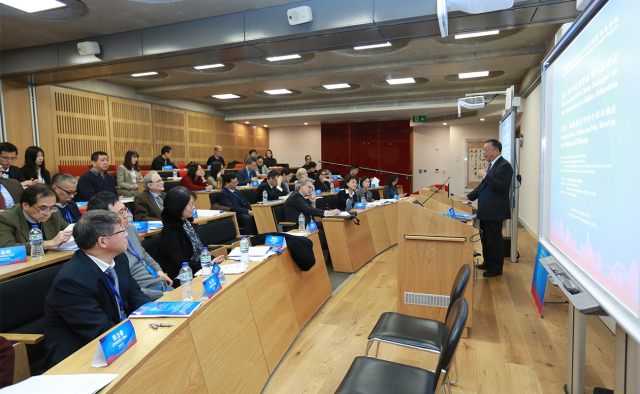Academic summit looks at historical connections between China, West

The second UK-China Dialogue on the Humanities in Higher Education, an academic summit hosted by the China-UK Association for the Humanities in Higher Education, was held on Dec. 6 at Oxford University.
Chinese and British scholars of humanities recently gathered at Oxford University to explore the historical connections between China and the West in such aspects as social life, humanities, and modern thought.
The second UK-China Dialogue on the Humanities in Higher Education, an academic summit hosted by the China-UK Association for the Humanities in Higher Education, was held on Dec.6. As part of the fifth meeting of the China-UK High-Level People-to-people Dialogue, the event was jointly organized by the Institute for World Literatures and Cultures at Tsinghua University and the China Center at Oxford University. The theme was “Connections: China and the West in the Making of History.”
As time-honored major countries with profound humanities traditions, China and the United Kingdom are both facing challenges and historical opportunities when updating and extending their own conditions in the changeable age.
Chinese and British scholars at the forum discussed the connotations of modern civilization and Chinese humanism. They said the explanation of the former illustrates the latter.
On the world stage, theoretical construction as well as the historical discussion of humanities and humanistic values have long been guided by Western experience, while Chinese experience has been marginalized to a degree.
Chu Xiaoquan, a professor from the College of Foreign Languages and Literature at Fudan University, said that research comparing classical Chinese and Western Latin systems has been conducive to observing new language communication and changes in the historical context of economic globalization.
All civilizations communicate at two levels: written communication of the educated group and verbal communication in daily life, Chu said. China is unique in that the written culture closely mirrors verbal communication. Originating from the translation of verbal communication into written characters, the classical Chinese system has brought into being a powerful monolingualism.
Western civilizations, on the contrary, have a multilingual tradition. Since Greek and Roman times, competence in languages other than the mother tongue has been an essential condition for the educated to win social respect, Chu said. The evolution from monolingualism to multilingualism signals the progress of a civilization, Chu added.
In recent years, China’s higher education and social environment have become increasingly bilingual, while the Western world is becoming more monolingual, Chu said, calling for analysis of the phenomenon to understand the interrelations between different languages in the international environment.
Wu Juan, an associate professor from the Department of Chinese Language and Literature at Tsinghua University, offered an analysis of the first large-scale language communication in Chinese history, which was a linguistic innovation sparked by Buddhist scripture translation during the period from the Eastern Han Dynasty (25-220) to the Northern Song Dynasty (960-1127).
The introduction of Indian Buddhist sutras to China and the evolutionary model bear resemblances to the Western linguistic innovation mechanism, Wu said, adding that the two have more in common than people think.
The China-UK Association for the Humanities in Higher Education was established in December 2016 in Shanghai. Proposed by Tsinghua University, it is an international academic alliance for humanities consisting of 12 Chinese and British institutions of higher learning.
